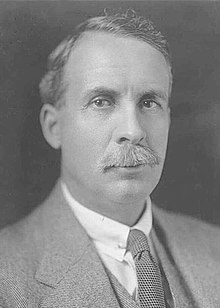George Pearce
|
The Honourable Sir George Pearce KCVO |
|
|---|---|
 |
|
| Leader of the Government in the Senate | |
|
In office 6 January 1932 – 29 November 1937 |
|
| Preceded by | John Barnes |
| Succeeded by | Alexander McLachlan |
| Senator for Western Australia | |
|
In office 29 March 1901 – 30 June 1938 |
|
| Personal details | |
| Born |
14 January 1870 Mount Barker, South Australia |
| Died | 24 June 1952 (aged 82) Elwood, Victoria |
| Nationality | Australian |
| Political party |
Labor (1901–17) Nationalist (1917–31) UAP (1931–38) |
| Spouse(s) | Eliza Maud Barrett |
| Occupation | Carpenter |
Sir George Foster Pearce KCVO (14 January 1870 – 24 June 1952) was an Australian politician who was instrumental in founding the Australian Labor Party in Western Australia.
Pearce, a carpenter, was born in Mount Barker, South Australia, to James Pearce (c. 1833 – 17 April 1919), a Cornish Australian, whose brother Charles Pearce (1826–1908) was MHA for East Torrens 1868–1870. He was educated at Red Hill Public School until he was 11, then worked on farms and later became a carpenter in Adelaide, but lost that job in the depression of 1891 and moved to Western Australia. He joined the Amalgamated Society of Carpenters and Joiners and soon became heavily involved in the union movement. In April 1897 he married Eliza Maud Barrett.
In 1893, Pearce helped found the Progressive Political League, a precursor to the West Australian branch of the ALP. Self-educated in politics and economics, in 1901 he was elected to the first Commonwealth Parliament as a Senator for Western Australia. He narrowly missed out on being a member of the first Labor Party Cabinet when Chris Watson became Prime Minister in 1904. In 1908, he became Minister for Defence in the Cabinet of Andrew Fisher. He oversaw the foundation of the naval college at Jervis Bay and Royal Military College, Duntroon. In 1914 Australia entered World War I. Upon Billy Hughes' ascension as Prime Minister, Pearce was named Deputy Leader of the party.
...
Wikipedia
